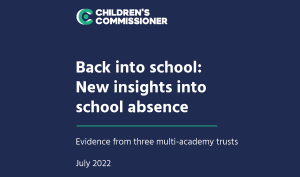As Children’s Commissioner for England, it is my job to listen to children. To make sure that everyone understands what they need to thrive, to be happy and healthy. I want every child to feel heard and listened to. That their views, experiences and outcomes are prioritised. Last year I launched The Big Ask survey, the largest ever survey of children in England with over 550,000 responses, giving children the opportunity to tell me what matters to them the most.
The Big Ask was launched as we were emerging from the pandemic and I heard loud and clear from children just how much they had missed school – they missed learning face-to-face with their teachers, they missed spending time with their friends, and they missed the extra-curricular opportunities provided by their schools that brought joy and excitement to their lives. The children I heard from in The Big Ask, those I’ve spoken to in my first year as Children’s Commissioner, as well as those I worked with in my career as a teacher and headteacher, have reinforced my commitment that school is the right place for children to be.
And yet, even before the pandemic, there was a group of children who struggled to attend school regularly and the pandemic has exacerbated this problem, increasing the number of children who are in danger of falling through the gaps in our education system.
As a result, I have made children’s attendance in school a key priority for my work this year. On 29 March I published the first interim findings from my Attendance Audit, based on a survey of 145 local authorities a cross England. Then, on 15 June I published the findings from my further deep-dive research with 10 local authorities of the experiences of children who are not attending school regularly or who are out of school altogether. The report, ‘Voices of England’s Missing Children’, details the solutions and practical ideas the young people and my team have identified that can make a real difference.
Today I am publishing new analysis that goes beyond the termly attendance statistics that the Government collects and looks in-depth at the daily patterns of children’s attendance.
This report finds that children who miss one of the first few days of the new term for unauthorised reasons are much more likely to miss long periods of their schooling than their peers who attended those first few days. These children had a predicted overall absence of almost 45%, or 31 days across the term compared to children who missed days near the end of term with a predicted overall absence of 20-30%. This shows just how important it is that children are at school, ready to learn in the first days of the September term.
The evidence in the report provides a roadmap for schools and local authorities to identify children at higher risk of missing more days of school and to provide interventions immediately, with the limited resources they have available. We don’t need to wait until a child has already missed seven or more days of the term to intervene and ask whether that pupil requires additional support.
My Back into School webpages provide a range of resources for schools, children and their families to help support children’s attendance. These pages will continue to be developed throughout the summer with information, guidance and best practice examples.
I want every child to feel excited, confident and supported in September, no matter where they are going, from children just starting primary to young people going into their last year of college. I will continue listening to children and young people, learning how we can make education even better and working to bring children’s voices into the heart of Government.






